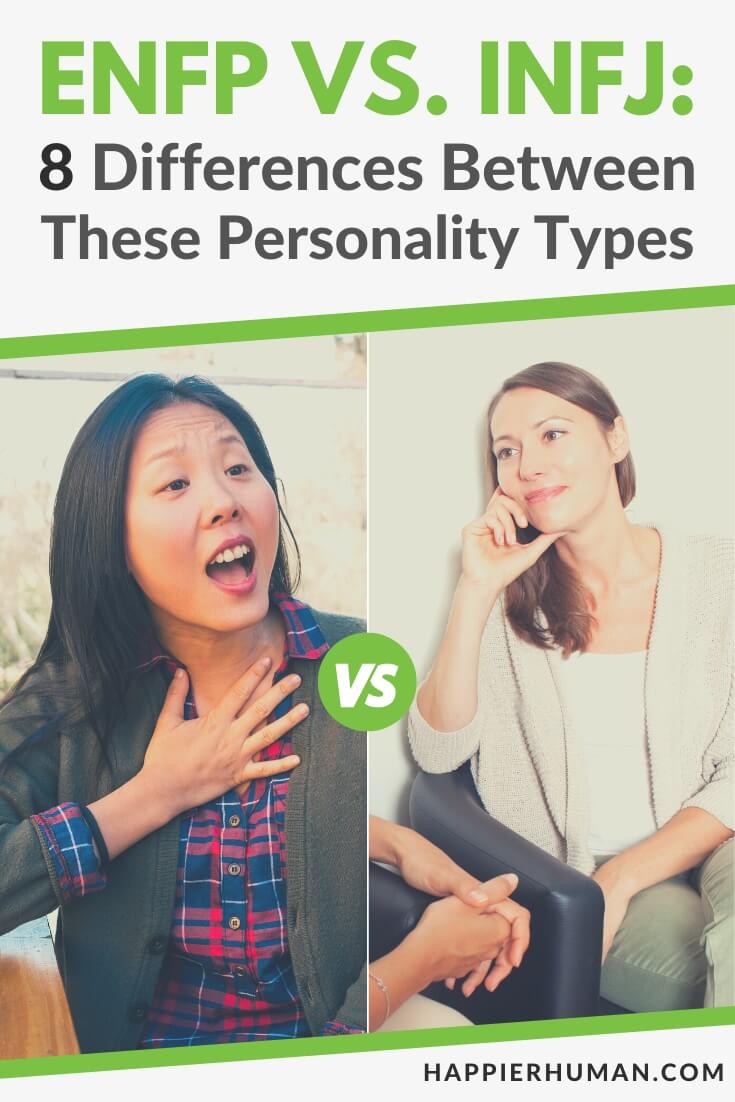You need to look beyond the surface when comparing ENFP vs. INFJ personality types. For instance, ENFPs tend to be flexible, outgoing, and spontaneous, while INFJs are introspective, quiet, and reserved.
However, there is much more to these personality types than just these basic traits. So let's take a closer look at the key differences.
What Is the ENFP Personality Type?
ENFP stands for extraverted, intuitive, feeling, and perceiving.
ENFPs are often described as “champion idealists.” They are passionate and enthusiastic people who see the world in terms of possibilities. They quickly see potential solutions to problems and always look for new opportunities. In addition, ENFPs are often skilled at finding creative ways to overcome obstacles.
ENFPs are outgoing people who enjoy spending time with others. They are often charming and can be persuasive when they need to be. ENFPs enjoy being around people and thrive in social situations. They like to have many friends and acquaintances.
ENFPs tend to be flexible and adaptable. They usually prefer to keep their options open to change their plans if necessary. ENFPs do not like feeling restricted or confined. They like to have a lot of freedom in their lives.
There are many famous people and celebrities with the ENFP personality type. A good example is Will Smith, the rapper turned actor and movie star. Other ENFPs include Robin Williams, Charles Dickens, and Tom Brady.
What is the INFJ Personality Type?
INFJ stands for introverted, intuitive, feeling, and judging.
The primary function of INFJ individuals is Introverted Intuition, which means they are good at seeing patterns and making connections. They are also very compassionate and empathetic people.
INFJs are usually quiet and reserved. They are very private and often keep their thoughts and feelings to themselves. They are also generally quite intuitive and can be very helpful in problem-solving. However, they may have difficulty expressing their ideas and thoughts verbally.

INFJs often have strong values and a deep sense of morality. They may be drawn to causes they feel passionate about, such as social justice or environmentalism. They may also be drawn to helping professions such as teaching, psychology, or counseling.
INFJs often prefer to work alone or in small groups. They may find large groups or crowds to be overwhelming. They may also prefer to work on projects that have personal meaning.
Celebrities and famous individuals in this category include Martin Luther King Jr., Nelson Mandela, and Mahatma Gandhi.
What Do the ENFP and the INFJ Personality Types Have in Common?
Although the ENFP vs. INFJ personality pairing hasn't been discussed as widely as other personality pairings, few are more compatible than the ENFP and the INFJ.
The two share several key traits, including intuition, imagination, and introspection. In many ways, the ENFP and the INFJ are like two peas in a pod.
Intuition
ENFPs and INFJs are both highly intuitive. They can read people and situations very well and usually have a good gut feeling about things. This intuition comes from their dominant function, Extraverted Intuition (Ne).
Ne is constantly taking in information from the world around them and connecting different ideas and concepts. This ability to see patterns and relationships allows ENFPs and INFJs to have such strong intuitions.
Imagination and Creativity
Another key trait that the ENFP and the INFJ share is their imagination. These two personality types are known for their creative minds and their ability to see things from a different perspective.
This makes them great problem-solvers and allows them to come up with outside-the-box solutions.
Introspection
Lastly, the ENFP and the INFJ are both introspective personality types. This means that they are always looking inward and trying to understand themselves on a deeper level.
This introspection can sometimes be overwhelming, but it also allows these two personality types to grow and develop in ways others can't.
8 Key Differences Between the ENFP and INFJ Personalities
While the ENFP and the INFJ personality types are intuitive, creative, and reflective, some key differences set them apart.
Here are three of the most fundamental ways in which the ENFP and the INFJ differ:
1. Areas of Interest
ENFPs and INFJs also tend to differ in their areas of interest. While both personality types are creative, outgoing, and intuitive, they often have different interests.
For example, an ENFP might be interested in art or music, while an INFJ might be interested in psychology or history. These differences in interests can leave each personality type feeling like they don't understand or relate to the other.
However, these differences can also be complementary. For example, an ENFP's creativity might inspire an INFJ to be more innovative in their ideas, while an INFJ's depth of knowledge can help an ENFP to see things from a new perspective.
Understanding and respecting each other's areas of interest is key to a successful relationship between these two personality types.
2. Values and Motivations
Regarding values and motivations, ENFPs and INFJs differ quite a bit.
For ENFPs, the focus is often on novelty, change, and creativity. They are driven by a strong desire to explore new possibilities and to find ways to make things more exciting. They are also highly motivated by their relationships and their need for connection.
In contrast, INFJs tend to value stability, constancy, and tradition. They are motivated by a need for meaning and purpose in their lives. Relationships are also important to them, but they place a greater emphasis on quality over quantity.
So, while both types may value close relationships, ENFPs are more likely to seek out multiple relationships. At the same time, INFJs are more likely to invest deeply in fewer close relationships.
3. Communication Styles
ENFPs are typically more expressive and enthusiastic in their communication than INFJs. However, they may interrupt others more often and have difficulty staying on topic.
Conversely, INFJs are usually more reserved in their communication and prefer to listen more than they talk. They also tend to be better at staying on topic when conversing with others.
These differences in communication style can sometimes lead to misunderstandings or conflict between the two personality types.
4. Energy Levels
ENFPs and INFJs also differ in terms of energy levels. ENFPs tend to have higher energy levels than INFJs and may find sitting still for long periods challenging. They may also have a hard time understanding why others don't share their same level of energy and enthusiasm.
On the other hand, INFJs may appear calmer and more introspective than ENFPs, but this doesn't mean they don't care about the world around them. In fact, INFJs often care very deeply about social justice issues and making a difference in the world.
5. Decision-Making Processes
ENFPs usually make decisions based on their feelings and values, while INFJs tend to analyze all available information before deciding.
This can sometimes lead to tension between the two personality types, as the ENFP may feel that the INFJ is being too indecisive or overthinking things.

In contrast, the INFJ may think that the ENFP is not considering all the relevant information before deciding.
This doesn't mean that one way of decision-making is better, but it does mean that ENFPs and INFJs may approach problem-solving differently.
6. Recharging
The ENFP is a people-oriented person who recharges with action. They may feel drained after being alone for too long and need to be around others to feel energized.
On the other hand, the INFJ is more introspective and recharges by spending time alone. They may feel overwhelmed by too much social interaction and need time to themselves to reflect and recharge.
Although they have different needs, the ENFJ and the INFJ can understand and respect each other's need for space. When one person needs to recharge, the other can give them the space they need without taking it personally.
This understanding can help to create a strong bond between these two personality types.
7. Emotional Availability
ENFPs are generally more emotionally available than INFJs. This means they are more likely to be in touch with their own emotions and more able to express them openly to others.
This can make ENFPs seem more “in your face” than INFJs, who may be more guarded with their feelings. However, it also means that ENFPs can be more supportive and empathize more easily with others.
8. Population Statistics
ENFPs make up a much more significant percentage of the population than INFJs. ENFPs constitute about 8.1% of the population, with INFJs just 1.5%. This means ENFPs are nearly three times as common as INFJs.
That said, it's essential to remember that these are rough estimates and that the actual numbers may be higher or lower.
Final Thoughts on the ENFP and INFJ Personalities
ENFPs and INFJs are highly creative and enjoy spending time with those they love. However, ENFPs are extroverts who crave social interaction, while INFJs are introverts who prefer quieter settings.
If you're dating or befriending someone with one of these personality types, it's essential to be aware of these differences to best connect with them. Better yet, you may want to look at this beginner's guide that breaks down the key characteristics of all the 16 personality types created by Myers & Briggs.
You might be interested in this personality type test if you're an ENFP or INFJ. This test can help you determine the characteristics most prevalent in your personality.
Finally, if you want to identify YOUR personality type, then take one of these 11 personality tests to better understand what makes you tick.


